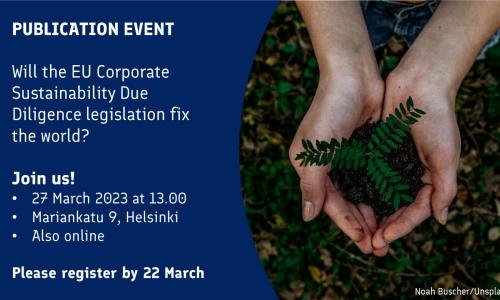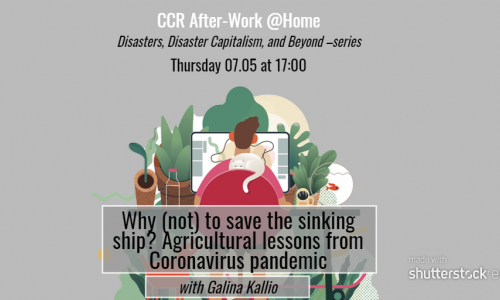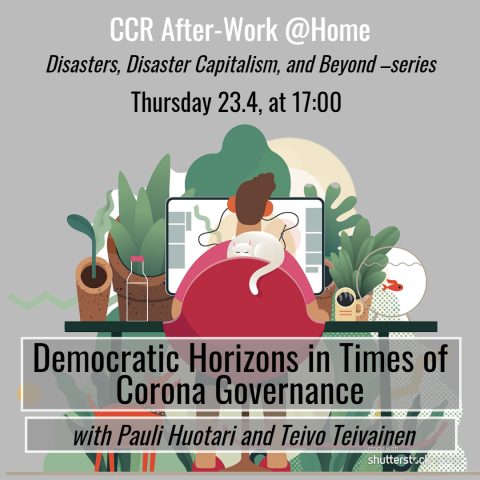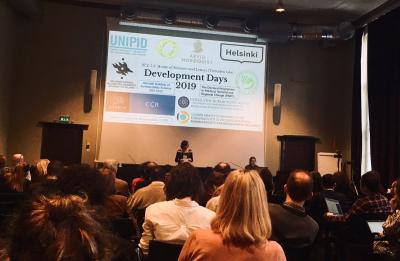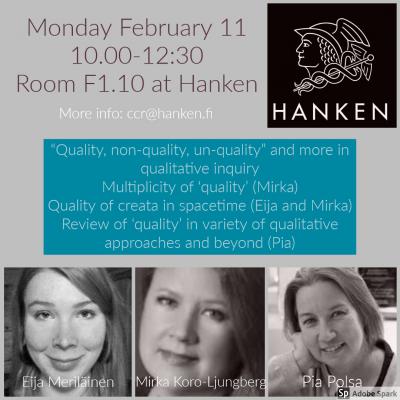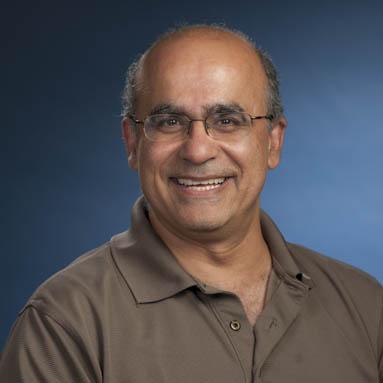News and Events
2024-2025
Project Course in Corporate Social Responsibility and Humanitarian Logistics - Spring 2025
Hanken is looking for organisations to participate in our upcoming project course in CSR and Humanitarian Logistics in spring 2025!
Course aim: The aim of the 10 ECTS course is to immerse students in questions related to social and environmental responsibility by using, analysing, and solving real-world problems provided by case organisations.
During the course students work in groups of 3-4 persons with a project for an organisation involving 200h of work per student (100h for delivering the project to the organisation, 100h for the academic part, including contact hours, presentations, and the final report). Organised annually by CCR, this course offers students valuable work experience and insights into CSR and humanitarian logistics.
The course has been running for eleven years now and many companies and NGOs have participated over the years. The collaboration has proved to be quite fruitful for both students and the organisations based on the feedback we receive, and we are sure that it will continue to be so.
You can also see our past news about the project course here.
The course is aimed at master’s level and Corporate Responsibility (CR) Module students who already have a basic knowledge of CSR and belong to a mixed cohort ensuring diversity in background, knowledge, and education. The CR Module is a 2-year study module offered to a group of 40 external participants belonging again to a mixed cohort of students and working professionals. The next course iteration runs from 21 January- 7 May 2025.
For organisations, participating in the course would entail:
- Developing a project brief that would give value to your organisation and that is in line with the course aim and intended workload for students (we can have a call about this and help you develop the brief if you want). The project brief will be checked by the course examinator to make sure that the scoping fits with the course workload.
- Presenting your organisation and the project at the kickoff session for the course in January (takes 30 min)
- Being present and giving feedback to students at the final presentation session in May, where they present their findings (takes 30 min).
- Providing the student group with access to necessary resources (depending on the nature of the project) and giving guidance on their work. This is where the time demanded can vary depending on the project in question. Students usually work very independently throughout the course, but we encourage that the contact(s) from the organisation should have 4 meetings (at a minimum) with the student group throughout the project between January and May.
- Filling out a feedback form at the end of the course (takes about 5-10min).
At the end of the course, organisations will be provided with the final report for the project.
Do you have a case or problem related to social and/or environmental responsibility and would like our students to assist with? Let us know at prme@hanken.fi, latest by 24.10.2024.
2022-2023
Will the EU Corporate Sustainability Due Diligence legislation fix the world?
Monday, March 27 at 13.00
The Ministry for Foreign Affairs is hosting a hybrid event to launch two studies on the impact of EU Corporate Sustainability Due Diligence legislation on developing countries, their trade, and business.
Researchers from Hanken School of Business and the University of Vaasa have conducted case studies from Ethiopia, Tanzania, and the Democratic Republic of the Congo to understand how regulation would affect the economy of the developing countries, what bottlenecks regulation can create for participation in EU value chains, and how Finland could support them in achieving the EU's corporate responsibility regulation. The event will be held in English.
Please register by March 22.
Registration here!
If you have any questions, do not hesitate to reach the organisers at ccr@hanken.fi Opens in new window
2020 - 2021
"Crisis, COVID & the case for cross-disciplinary studies" with Jeff Hearn
Warm welcome to CCR After-Work @Home! #4 /Disasters, Disaster Capitalism, and Beyond –series
Thursday May 14.
For this session, CCR collaborates with the GODESS Institute and invites Jeff Hearn to talk about "Crisis, COVID and the case for cross-disciplinary studies for the future".
Jeff will introduce the session with some comments on his recent co-authored article on Interdisciplinary Crisis Studies in Global Discourse, and some reflections on possible social impacts of COVID-19 and future thinking.
“Historically, pandemics have forced humans to break with the past and imagine their world anew. This one is no different”
- Arundhati Roy, ‘The pandemic is a portal’
In a series live-streamed sit-ins during the Covid-19 pandemic, we invite a number of researchers to present one idea related to the our series theme “Disasters, Disaster Capitalism, and Beyond” in 20 minutes. After the presentation we invite the virtual audience for questions and discussion through chat or audio.
Remember to put a beer in the fridge and join your colleagues for a semi-informal after-work @home!
If you have any questions, do not hesitate to reach the organisers at ccr@hanken.fi Opens in new window .
"Agricultural lessons from Coronavirus Pandemic" with Galina Kallio
Warm welcome to CCR After-Work @Home #3! /Disasters, Disaster Capitalism, and Beyond –series
Why (not) to save the sinking ship? Thursday May 07 at 17:00-18:30
“Historically, pandemics have forced humans to break with the past and imagine their world anew. This one is no different”
- Arundhati Roy, ‘The pandemic is a portal’
In a series live-streamed sit-ins during the Covid-19 pandemic, we invite a number of researchers to present one idea related to the our series theme “Disasters, Disaster Capitalism, and Beyond” in 20 minutes. After the presentation we invite the virtual audience for questions and discussion through chat or audio.
On May 07 at 17:00, we will discuss about "Why (not) to save the sinking ship? Agricultural lessons from Coronavirus pandemic" with Galina Kallio.
Remember to put a beer in the fridge and join your colleagues for a semi-informal after-work @home!
About the presenter:
Galina Kallio is a postdoctoral researcher at the University of Helsinki, Ruralia Institute. Her research focuses on alternative economies, regenerative agriculture, conceptualisations human-nature relationships and methodologies for studying non-symbolic and sensuous ways of knowing. She works in the intersection of academia and activism, and actively participates in societal discussions arguing for bio-centric paradigm shift.
If you have any questions, do not hesitate to reach the organisers at ccr@hanken.fi Opens in new window
"Democratic Horizons in Times of Corona Governance”, with Pauli Huotari & Teivo Teivanen
CCR After-Work @Home #2 "Disasters, Disaster Capitalism, and Beyond –series"
Thursday 23.4, at 17:00
“Historically, pandemics have forced humans to break with the past and imagine their world anew. This one is no different” - Arundhati Roy, ‘The pandemic is a portal’
A warm welcome to our 2nd digital After-Work @Home! In a series live-streamed sit-ins during the Covid-19 pandemic, we invite a number of researchers to present one idea related to the our series theme “Disasters, Disaster Capitalism, and Beyond” in 20 minutes. After the presentation we invite the virtual audience for questions and discussion through chat or audio.
Remember to put a beer in the fridge and join your colleagues for a semi-informal after-work @home!
Teivo Teivainen is professor of world politics at the University of Helsinki. His work on political economy has received the Hopkins Award of the American Sociological Association for his book Enter Economism, Exit Politics (published by Zed Books in 2002) and the Amartya Sen Prize of Yale University for the article, coauthored with Matti Ylönen, “Politics of Intra-firm Trade” (published in New Political Economy in 2018). He currently leads Academy of Finland project on transnational non-state representation.
Pauli Huotari is a doctoral candidate in World Politics, University of Helsinki. His research interests include the role of economics, economists and economic ideas in societal change and continuity. He has long been involved in various civic movements.
Read their short article Democratic horizons in times of corona governance here!
“Governance of and by exception: COVID-19”, with Eija Meriläinen
CCR After-Work @Home #1 "Disasters, Disaster Capitalism, and Beyond –series"
Thursday April 16, at 17:00
A warm welcome to our 1st-ever digital After-Work @Home!
Eija Meriläinen is a doctoral student in Supply Chain Management and Social Responsibility at Hanken. She studies disaster governance, striving to understand the roles and power of various organizations and institutions in responding to, recovering from and preparing for disasters. Her dissertation focuses on how the responsibility and ability of ‘communities’ is framed within the resilience discourse, particularly by non-governmental organizations whose influence within disaster governance is growing. The research draws mostly from the fields of disaster studies and human geography, but is interdisciplinary in nature. Theoretical and conceptual frameworks such as The Right to City and social contract thinking have been useful in approaching the phenomenon critically.
2018 - 2019
19/11 2019 Responsible Organising Conference #3
23/09 2019 Seminar Invisibilities of Business Violence
29/05 2019 Seminar "Human rights – why should investors care?"
28/05 & 29/01 2019 "What do you think?" Seminar #5
Development Days 2019
CCR is happy to support and participate in the Development Days 2019: Repositioning global development: changing actors, geographies and ontologies (27/02-01/03 2019). More info about the conference here.
CCR “2019 Kick-Off” session on February 15 from 10:30 to 12:00
at Hanken School of Economics (room A305)
This session is composed of the presentation of CCR new board members Opens in new window , what has happened in 2018 and what is to come in 2019!
“Quality, non-quality, un-quality” and more in qualitative inquiry
During the recent critical and post-turns ‘the quality question’ in qualitative inquiry has been somewhat bypassed and maybe deemed irrelevant. Many different approaches to address the quality have been developed including different conceptualizations of validity, validation, relationality, and ethics. In this panel each presenter highlights different perspectives on how to respond to the question of quality in today’s neoliberal contexts. This panel returns to the series of quality questions and it aims to problematize the concept and its uses and non-uses. We argue that even though the concept of ‘quality’ might be more or less productive in qualitative inquiry the question of worth, value, and goodness of qualitative inquiry has not disappeared but continues to linger. How should qualitative researchers respond? Who might be willing to respond to the inquiries often coming from other disciplines and inquiry traditions? How might the global community address the quality question differently?
Practices, Pitfalls and Promises: Blockchain Technology for the Supply Chain and Sustainability
Professor Joseph Sarkis, Ph.D.
Foisie School of Business
Worcester, MA, USA
Tuesday December 18 at 12:00 (2018)
Room A303, Hanken School of Economics, Arkadiankatu 22, 0100 Helsinki
This presentation will provide an overview of the role blockchain technology can play in both supply chain management and sustainability. It will provide an update on an exploratory study on this topic and some initial findings. After presentation of definitions, background, barriers, and potentials, and initial results, an open discussion will ensue. This discussion will focus on the role that blockchain can play for corporate responsibility, transparency, and sustainability along its supply chain.
About prof. Joseph Sarkis: Joseph Sarkis is professor at Worcester Polytechnic Institute in Massachusetts, USA. He previously served as a faculty member at Clark University and the University of Texas at Arlington. His teaching and research interests are in the fields of operations, supply chain management and sustainability. He is the author or co-author of over 400 publications and his research is widely cited and earned the designation of highly cited researcher in 2016 and 2017 from Thomson-Reuters/Clarivate Analytics. He is the Editor-in-Chief of IEEE's Engineering Management Review and Associate Editor of Sustainable Supply Chains for Resources, Conservation and Recycling . He is also Co-Editor of the Greening of Industry Networks Springer-Nature Book Series.
Coffee will be served. Warm welcome to all!
Questions? Do not hesitate to contact us at ccr@hanken.fi
13/11 2018 Responsible Organising #2
Arctic Railway Plans Between Finland and Norway and Indigenous Peoples’ Rights
Date: Thursday, 06 September 2018
Time: 16:00 - 17:30 (UTC +3)
Place: University of Helsinki, Konsistori Hall, 2nd floor of main building (Fabianinkatu 33)
Convenor: Hanken School of Economics, University of Helsinki (Tiina Jääskeläinen, Pirjo Kristiina Virtanen, Kukka Ranta)
Access: Public
This panel discussion addresses Arctic environment, Indigenous peoples' rights and megaprojects in the Arctic region, focusing on the plans of the rail line plans between Finland and Norway. The event addresses the current status of improvement plans for better accessibility and logistics. The plan between Oulu and Kirkenes has been presented as less costly in the study by transportation agencies. We ask, what is the role of local and Indigenous people’s participation in the study and decision-making processes? How to guarantee free prior and informed consent (FPIC) and indigenous peoples' rights? What are the impacts of the railway to the Sámi traditional knowledge and livelihoods? How will the railway affect Arctic environment and the lives of nonhumans? And, finally, how is "development" measured in the Arctic?
Invited panelists:
• Tiina Sanila-Aikio, President of the Sámi Parliament
• Kai Kokko, Professor of Environmental Law, University of Helsinki
• Tero Vauraste, Chair of the Arctic Economic Council
• Local representatives from Sámi associations, through video
• Anni Rimpiläinen, The Finnish Transport Agency
Organisers:
Tiina Jääskeläinen, Doctoral student, Hanken School of Economics, Centre for Corporate Responsibility (CCR)
Pirjo Kristiina Virtanen, Assistant Professor, University of Helsinki, Indigenous Studies
Kukka Ranta, Doctoral student and journalist, University of Helsinki
COREvents #2: Using collaborative knowledge practices in environmental planning and decision-making
How is trust in expertise generated and lost in environmental policy? How to overcome challenges in democratising environmental expertise? Why is joint fact-finding useful in complex planning and decision-making processes and how to apply it in practice?
The second COREvent explores the potential of inclusive knowledge practices to bridge the gap between science and environmental policy making and create a shared knowledge base that different actors consider relevant and reliable.
Three leading scholars, Prof. Susan Owens (Cambridge University, UK), Prof. Esther Turnhout (Wageningen University, the Netherlands) and Prof. Masahiro Matsuura (Meiji University, Japan) will share their insights on the ways to improve science-policy interface and broaden knowledge communities in environmental planning and policy-making context. You are warmly welcome to join the event!
Date: 4 September, 2018, 15:00-18:00
Place: Auditorium Laulujoutsen, 1st floor, The Finnish Environment Institute (SYKE), Mechelininkatu 34a, Helsinki
Programme:
Prof. Susan Owens: Trust in Expertise for Environmental Policy
Prof. Esther Turnhout: Democratising environmental expertise: challenges and opportunities at the science-policy-society interface
Prof. Masahiro Matsuura: Linking contested expert knowledge to collaborative governance: joint fact-finding
No registration is needed.
Bios:
Susan Owens is Emeritus Professor of Environment and Policy and Fellow Emerita of Newnham College, University of Cambridge. She has researched and published widely in the field of environmental governance. Her current projects are concerned with relations between science and politics, and with the role of argument, evidence, ideas and advice in policy formation and change. She has also worked extensively on interpretations of sustainable development in theory and practice, and has theorised connections between environmental planning conflicts (especially those concerned with contentious technologies and infrastructures) and developments in wider domains of public policy.
Esther Turnhout is Full Professor at the Forest and Nature Conservation Policy Group of Wageningen University, the Netherlands. Her research program The Politics of Environmental Knowledge includes research into the different roles experts play at the science policy interface, the political implications of policy relevant knowledge, and the participation of citizens in environmental knowledge making, also known as citizen science. Current research focuses on the UN Intergovernmental Platform for Biodiversity and Ecosystem Services (IPBES), wildlife management and invasive species, auditing practices in forest management and the production of transparency and traceability in global value chains.
Masahiro Matsuura is Professor at the Graduate School of Governance Studies, Meiji University, Japan. He is also the head of Democracy Design Lab, a non-profit organization for promoting democratic engagements in Japan, and one of the co-founders of Consensus Building in Asia, a network of practitioners and scholars interested in collaborative processes in Asia. His research interests include the theory and practice of consensus building, negotiation and deliberative democracy in the urban and environmental planning sectors.
Join the discussion in social media: #corestn, #yhteishallinta, #strateginentutkimus
COREvents is a series of open discussions, lectures and workshops organised by CORE project, funded by the Strategic Research Council at the Academy of Finland. CORE explores the potential of collaborative approaches to environmental planning and decision-making, with the mission to facilitate a collaborative turn in Finland.
15/08 2018 - Seminar "The Political Ontology of Corporate Responsibility research"
COREvents #1: Collaboration and conflict resolution in environmental decision-making - why is it needed and what makes it work?
How could today’s complex and controversial problems such as those related to land use, energy or use of natural resources be solved wisely and fairly?
COREvents #1 provided international insights in why collaboration and conflict resolution is needed and what makes it work. See the video here!
In this first COREvent, two world class experts on collaboration, prof. Pieter Glasbergen (Netherlands) and prof. Michael Brown (Canada), will share their knowledge on how good results have been achieved by adoption of specific collaborative approaches to planning and decision-making.
In Finland, the potential of such approaches is underused. What could we learn from international practice?
Date: 29 May, 2018, 13:00-16:00
Place: The Swedish School of Economics (Hanken), Auditorium Futurum, Arkadiankatu 22, Helsinki
Programme:
Prof. Michael Brown (1), Consensus Building Institute: Mediation and Collaborative Dialogue: Tools to Address Natural Resource Disputes
Prof. Pieter Glasbergen (2), Utrecht University and the Netherlands Open University: Foundations of the Partnership Paradigm and Beyond
Comments from organisations operating in the field of environmental governance in Finland (to be confirmed)
About the speakers:
(1) Michael Brown is Director of the Consensus Building Institute’s Canada Practice, Professor of Practice in Natural Resource Conflict Mediation at McGill University, and former Senior Mediation Expert in Natural Resource and Land Conflicts for the United Nations Standby Mediation Team. For more than 25 years, he has worked on conflict prevention, mediation, and stakeholder engagement regarding natural resources, land, environmental issues, and matters involving local or indigenous communities. He works on projects and disputes, institutional capacity, systems design, and policy. He has lived and worked internationally for many years, and held numerous leadership and senior advisory positions with the United Nations and other international organizations. His work is focused largely on international and Canadian projects.
(2) Pieter Glasbergen is emeritus Professor of Environmental Studies; Policy and Management at Utrecht University and the Netherlands Open University. Since 2011 he is honorary professor Governance for Sustainable Development at Maastricht University. His research focus is on governance for sustainable development. The articles, reports, and books that he published include both theoretical studies on policy and governance and applied policy research. His main research is on global cross-sector partnerships for sustainable development. He was the first professor of environmental policy in the Netherlands. He chairs the Maastricht-Utrecht-Nijmegen Program on Partnerships (www.munpop.nl) and is the founder of several teaching programmes and research program Governance for Sustainable Development at Utrecht University. Besides academic positions he has experience as a council member and vice-mayor in the city of Culemborg.
05/03 & 07/05 2018 - "What do you think?" Collaborative and Cross-disciplinary Seminars
20/03 2018 - Seminar on "Responsible meta-organisations"
2016 - 2017
15/12 2017 - CCR Christmas Research-Get-Together!
14/12 2017 - Seminar with DS Fellow Henning Grosse Ruse Khan
13/11 2017 - Responsible Organising Conference
16/10 & 11/12 2017 - “What do you think?” – Collaborative and Cross-disciplinary Seminars
05/10 2017 - Researchers' comments on state-owner governance memo on Finnfund (In Finnish)
tiedeyhteisonkommentit_finnfundin_omistajaohjauksen_kehittamiseen.pdf Opens in new window
tiedeyhteisonkommentit_finnfundin_omistajaohjauksen_kehittamiseen.pdf
31/08 & 01/09 2017 - Two open research seminars with visiting researcher Farzad Khan
31/07 2017 - Hanken receives funding for SUSMINO consortia from Ekon. dr Peter Wallenbergs Stiftelse för Ekonomi och Teknik
Hanken has been granted 300 000 SEK by Ekon. dr Peter Wallenbergs Stiftelse för Ekonomi och Teknik for the project 'Sustainability challenges of mining in the Nordic countries: the business, politics and society (SUSMINO)'' .
The project is a cooperation between Centre for Corporate Responsibility (CCR) at Hanken, Finland; Centre for Sami Studies at UiT The Arctic University of Norway, Norway and the Department of Urban and Rural Development, Swedish University of Agricultural Sciences, Sweden
About the project: Sweden and Finland are currently experiencing a renewed mining boom in their northern territories. Many local communities in these areas are economically and culturally dependent on reindeer herding and other land-based livelihoods. While mining operations may boost rural economies, they may also have an adverse impact on the environment and regional livelihoods. This creates a risk of social and political conflicts, which can question the sustainability of mining, affect the companies’ performance and reputation negatively, and produce cross-border political instability. There have been various research projects on the complex social, cultural and political drivers, contexts and impacts of mining in the Nordic countries. By organizing three research workshops in 2018-19, the SUSMINO project seeks to build a synthesis on the research findings of previous projects to identify the key sustainability challenges and ways to tackle them in Nordic mining. The project promotes networking between Nordic scholars in social sciences, humanities and business studies as well as with business practitioners and stakeholders. One of the workshops is dedicated for connecting Nordic junior researchers with broader international research networks and key stakeholders of Nordic mining, facilitating interdisciplinary and cross-border collaboration in doctoral supervision, and identifying further research opportunities especially for junior researchers.
For more information contact consortia leader Dr. Ville-Pekka Sorsa at ville-pekka.sorsa@hanken.fi
5th CR3+ Conference
Making Corporate Responsibility useful, April 28-29, 2017, Hanken School of Economics
The fifth CR3+ conference will take place at Hanken in Helsinki on April 28-29, 2017.
27/04 2017 - Research Seminar of Jeremy Moon
08/02 2017 - PRME Statement in Defense of Universal Values and Principles as Preconditions for Responsible Management Education
Hanken is one of 29 higher education institutions worldwide in the PRME (Principles for Responsible Management Education) Champions and stands behind the statement in defense of universal values and principles made by PRME on 8 February 2017.
From Andrew Main Wilson - Chair, PRME Steering Committee
and Jonas Haertle - Head, PRME
Dear Colleagues,
The mission of the Principles for Responsible Management Education (PRME) initiative is to transform management education, research and thought leadership globally by providing the Principles for Responsible Management Education framework, developing learning communities and contributing to the achievement of the United Nations' Sustainable Development Goals. The PRME initiative comprises over 600 business schools and management-related academic institutions in over 85 countries worldwide.
Our global community has thrived on the commitment and the ideas brought by people from around the world. We contribute to global knowledge through the free movement of students, teachers and researchers. Furthermore, as a UN-backed initiative, we are speaking up to defend universal values and principles of the United Nations, namely equality, non-discrimination, freedom, and diversity. We are convinced that these values and principles are one of our greatest strengths. Therefore, we are deeply concerned about growing protectionism, nationalism and populism on the global stage. Any form of discrimination related to religion, ethnicity or nationality is against the fundamental principles and values on which our societies as well as educational and research activities are based. Scientific progress depends fundamentally on an open exchange of ideas, scholars and students. To meet global challenges like climate change that are threatening our lives and those of future generations, we must depend on a science-based system of evidence. In combination, these developments have significant negative impacts on our economies and societies, on cooperation and peace in the world.
We considered the implications for the 2017 Global Forum for Responsible Management Education – 7th Opens in new window PRME Assembly and PRME’s 10th Anniversary scheduled to take place in New York City, USA, this July. We have deep concern for those potentially restricted from attending our conference and the implications for our shared values. Like other academic organisations we deliberated on a potential cancelation. After intensive consultations we decided to continue planning the event in NYC for the following reasons:
We want to signal our support for the values and principles of equality, non-discrimination, freedom and diversity.
We want to make use of the opportunity to address the issues in a meeting with the United Nations’ High-Level Political Forum (HLPF).
We will adapt our agenda to provide space for discussing the reasons for our concerns in a constructive manner.
We will make every effort to connect with those restricted from attending via technology.
Future annual PRME conferences will be organised in locations providing equal access to all participants.
PRME signatories are reminded that they are welcome to attend regional PRME Chapter meetings in other locations as well, a full overview of meetings can be found on the PRME website Opens in new window .
We are heartened by the leadership shown by academic institutions, corporations and graduates of business and management schools, particularly in support of refugees. Refugees fleeing conflict and persecution are finding more and more borders closed and increasingly restricted access to the protection they need and are entitled to receive, per international refugee law.
We remain committed to our mission to prepare a new generation of globally responsible leaders and to preserve the freedom of research, teaching and learning in an international community. It is part of our responsibility to critically address any threats to these fundamental values and principles.
We call for more business and management-related higher education institutions around the world to join us and stand up for the principles and values we all share.
With warm regards,
Andrew Main Wilson - Chair, PRME Steering Committee
Jonas Haertle - Head, PRME
This statement is issued on behalf of the PRME Steering Committee Opens in new window and PRME Secretariat Opens in new window . For questions, please email info@unprme.org.
02/12/2016 from 14:00 to 17:00 - Researchers Meeting
CCR wishes to invite all interested faculty members and doctoral students at the University of Helsinki and Hanken School of Economics for a get-together to plan the activities of the Centre.
The meeting is on Friday December 2nd from 14:00-17:00 at Minerva-tori (Siltavuorenpenger 5 A). Please sign-up in advance and fill in a short survey on research interests and on-going projects on topics relevant to the centre on the link below by 23.11.2016:
https://www.webropolsurveys.com/S/A58F84E91353E6FB.par Opens in new window
During the event we will introduce CCR and its objectives, and make future plans for the centre. We would also like to use this event to map out and discuss existing research interests, funding needs and ideas, and possible synergies between researchers who have an interest in topics broadly linked to CCR's activities to ensure that CCR will serve the need and interests of all researchers linked to the centre.
We would be happy to answer any question you might have, please direct your queries to ccr@hanken.fi
On behalf of CCR, Nikodemus Solitander, Director, CCR
07/10/2016 from 15 to 16:30 - CCR Converses (vol.1): Jeroen Merk
CCR takes a head-start (we will arrange a more formal CCR researcher get-together towards the end of October at the University of Helsinki, more info soon) with organizing researcher conversations this Friday as we are visited Dr. Jeroen Merk, who is research associate at the International Institute of Social Science (ISS) of Erasmus University Rotterdam. Prior to this Jeroen has had a very long career as a researcher and policy coordinator for Clean Clothes Campaign, particularly working around working conditions in the readymade garment industry in Southeast Asia. Jeroen has also, among other things, co-authored an article with Frank den Hond*
Jeroen who is also interested in the intersection between activism and academia will first present his current research project but also have discussions and idea exchanges with Finnish researchers in the environs of CCR. The invitation is as always open to anyone with an interest!
Place/Time; Friday 7.10, 15.00-16.30, Hanken, Arkadia building (Perho-wing), Arkadiankatu 24, Seminar Room on the 0-floor (if you have problem entering the building call 040 3521451)
Jeroen will also speak in the morning at Eetti's and SASK's common event, for more info see: http://www.kepa.fi/tapahtumakalenteri/19832 Opens in new window
Short bio:
Jeroen's research interests lie at the crossroads of international relations, political economy, social movements, and the governance institutions of global industrial relations. He's e been particularly concerned with analysing the shifting nature of worker-employer relations within local, national and global (supply-chain) contexts; the role of ethical standards as embodied in codes of conduct and other voluntary instruments in regulating business practices; and the combined (but uneven) emergence of cross-border networks of NGOs and trade unions keeping transnational corporations accountable for labour rights violations. Since 2003, he was a research and policy coordinator at the International Secretariat of the Clean Clothes Campaign, a labour rights NGO with branches in 15 European countries and an extended network of partners in production countries. He was responsible for coordinating, planning and publishing research on the impact of private governance instruments on labour relations and working conditions. Jeroen has closely collaborated with unions, labour NGOs from South and South-East Asia, on these topics.
on behalf of CCR, Nikodemus Solitander, Director, CCR


